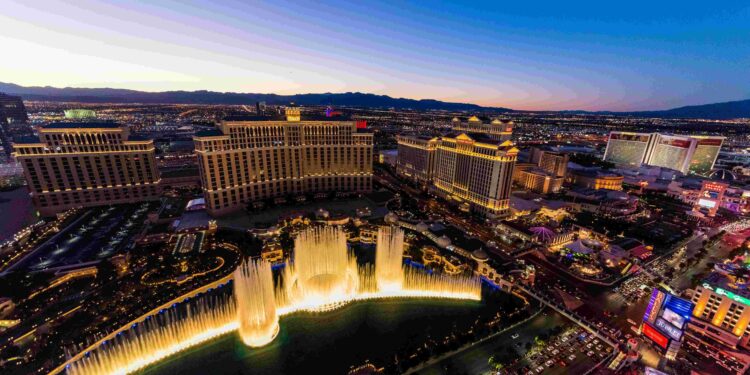Las Vegas, long heralded as a symbol of American entertainment and economic vitality, is experiencing a notable decline in tourism, raising concerns about potential ripple effects across the broader U.S. economy. Recent reports indicate that visitor numbers to the city’s casinos and resorts have dropped significantly, a trend experts link to shifting consumer behaviors and mounting financial uncertainties. As one of the nation’s major leisure hubs, Las Vegas’s downturn may signal deeper economic challenges ahead, highlighting vulnerabilities in sectors reliant on discretionary spending. This development has prompted analysts and policymakers alike to closely monitor the implications for the wider economic landscape.
Las Vegas Tourism Decline Signals Potential Nationwide Economic Challenges
Recent reports indicate a notable decline in visitor numbers to Las Vegas, a city long considered a bellwether for American consumer confidence and economic health. The drop in tourism-driven by factors such as rising travel costs, shifting entertainment preferences, and economic uncertainty-has immediate implications for local businesses, hospitality sectors, and employment rates. Experts warn that this downward trend may reflect broader national challenges, including inflation pressures and reduced discretionary spending.
Industry analysts pinpoint several key drivers behind the slowdown:
- Increased airfare and travel expenses deterring potential visitors
- Changing consumer habits with younger demographics prioritizing alternative experiences over traditional casino and resort visits
- Economic volatility leading to cautious spending across multiple sectors
| Sector | Year-over-Year Impact | Forecast for Next Quarter |
|---|---|---|
| Gaming Revenue | -7% | Flat |
| Hotel Occupancy | -5% | -3% |
| Employment in Hospitality | -2% | Stable |
Analyzing the Factors Behind the Drop in Visitor Numbers and Local Impact
The recent decline in visitor numbers to Las Vegas can be largely attributed to a combination of economic and social factors impacting the broader U.S. landscape. Rising inflation rates and increasing fuel costs have made discretionary travel less affordable for many Americans, leading to a notable pullback in tourism spending. Additionally, shifts in consumer behavior-such as a growing preference for staycations and alternative vacation destinations-have further dampened the city’s usual influx of visitors. Compounding these challenges are ongoing concerns about health and safety post-pandemic, which continue to influence travel decisions, particularly among older and more vulnerable demographics.
The ripple effects of this downturn extend beyond just hospitality revenues, significantly impacting local employment and small businesses that depend heavily on tourist dollars. Casinos, hotels, restaurants, and entertainment venues have all reported lower attendance, sparking concerns about job stability and reduced wage growth for workers in these sectors. The following table highlights key metrics comparing 2023 to 2022, illustrating the sharp decline in visitor engagement and its economic impact:
| Metric | 2022 | 2023 | Change (%) |
|---|---|---|---|
| Visitor Count (Millions) | 42.5 | 36.8 | -13.4% |
| Hotel Occupancy Rate | 89% | 77% | -13.5% |
| Average Daily Spend ($) | 185 | 162 | -12.4% |
| Tourism-Related Jobs | 145,000 | 131,000 | -9.7% |
Key contributing factors to this decline include:
- Economic uncertainty and tightening consumer budgets
- Higher transportation and accommodation costs
- Shifts in traveler preferences towards domestic and less crowded locales
- Lingering health and safety concerns related to COVID-19
– Changes in consumer behavior show a preference for staycations and alternative destinations, further reducing visitor inflow to Las Vegas.
– Health and safety concerns post-pandemic continue to affect travel decisions, especially among older and vulnerable populations.
– The downturn affects not only hospitality revenues but also local employment and small businesses reliant on tourist spending.
– Metrics from 2022 to 2023 show significant declines:
– Visitor Count dropped from 42.5 million to 36.8 million (-13.4%)
– Hotel Occupancy Rate fell from 89% to 77% (-13.5%)
– Average Daily Spend per visitor decreased from $185 to $162 (-12.4%)
– Tourism-Related Jobs reduced from 145,000 to 131,000 (-9.7%)
Key contributing factors summarized:
– Economic uncertainty and tighter budgets
– Higher costs of transportation and accommodation
– Traveler preference shifts toward less crowded, domestic locations
– Continued COVID-19 health and safety concerns
If you need a summary, rephrasing, or additional analysis of this content, please let me know!
Policy Recommendations to Revive Tourism and Stabilize Economic Growth
To counteract the recent decline in visitor numbers, several strategic measures should be prioritized. Investing in marketing campaigns that emphasize Las Vegas’s unique entertainment and cultural offerings can rekindle interest both domestically and internationally. Additionally, enhancing infrastructure-such as improving public transportation and updating airport facilities-will not only make the city more accessible but also appeal to a broader demographic of travelers. Partnerships between public and private sectors can foster innovation in digital booking platforms and contactless services, addressing ongoing health concerns and boosting traveler confidence.
Furthermore, policy frameworks must prioritize sustainable growth and economic diversification to shield Las Vegas from future shocks. This includes supporting small businesses in the tourism sector and incentivizing investments in emerging industries like renewable energy and technology. The following table outlines a set of targeted interventions proposed to revitalize key areas and stimulate visitor engagement:
| Policy Focus | Action Item | Expected Outcome |
|---|---|---|
| Marketing | Launch international digital campaigns | Increased global visitor inquiries |
| Infrastructure | Upgrade public transit and airports | Improved accessibility and convenience |
| Business Support | Provide grants to local operators | Faster recovery of small enterprises |
| Economic Diversification | Incentivize green technology investments | Long-term economic resilience |
Final Thoughts
As Las Vegas confronts a notable decline in tourism, the city’s struggles serve as a cautionary signal for the broader U.S. economy. Once a thriving hub of travel and entertainment, the downturn reflects wider challenges including shifting consumer behavior, inflationary pressures, and economic uncertainty. Industry experts and policymakers alike will be watching closely to see if Las Vegas can rebound or if its woes foreshadow a more protracted period of economic headwinds nationwide.










